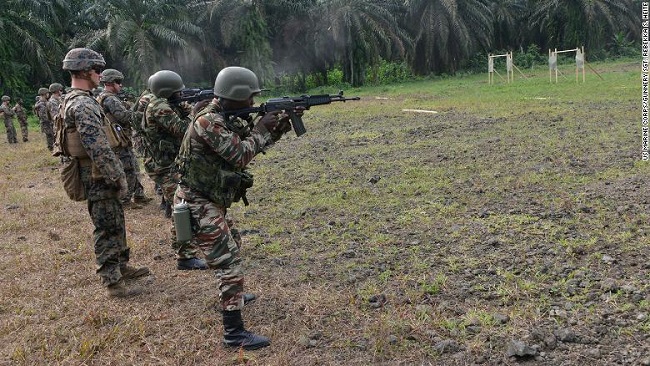8, May 2019
US Military Trains Cameroon Troops on Medical Evacuations 0
The U.S. military is training Cameroon’s military on first aid techniques and medical evacuation in order to reduce battlefield deaths. Cameroon estimates that one-fourth of all soldiers killed fighting separatists and Boko Haram terrorists could have been saved with better care.
Twenty-nine-year-old soldier Poumje Amidou has been getting treatment for fractures since last October at the military hospital in Yaounde.
Amidou said he barely escaped death when separatist fighters attacked his base, leaving one of his colleagues dead and two others wounded.
He said what he remembers is that he bled profusely and had serious wounds on his left leg, stomach and right arm.
Amidou’s life was saved when a Cameroon military helicopter rushed him to the hospital.
But others were not so lucky.
In recent years, about 117 soldiers have died from wounds that would not have been fatal had they received the correct first aid, according to Cameroon’s military.
That’s about one-fourth of all Cameroonian military deaths in the battles against English-speaking separatists and the Nigerian militant group Boko Haram.
Better care for the wounded
U.S. military advisers are working to prevent future deaths by training soldiers to provide better care for the wounded.
Major Mommearts, who did not give his first name, is one of the U.S. trainers.
He said the course on MEDEVAC – medical evacuation – includes evacuating casualties by air, known as CASEVAC.
“We talked about the different levels of CASEVAC, so you have your own legs, you can move the patient yourself, you have different pack bones that they can use. Make sure they are not bleeding while they are being transported.”
In February, the U.S. announced it was cutting some security assistance to Cameroon following allegations that Cameroon’s military was committing human rights violations.
The U.S. says despite the reduction in military aid, relations between the two countries are good.
The director of Cameroon’s military health, Colonel Abeng Mbozoo, said those ties are shown by the U.S. medical training.
He said the training is an indication that military cooperation between the U.S. and Cameroon is excellent. That is the reason the U.S. military has come to train their Cameroonian peers, said, Mbozoo, to save lives and prevent deaths in different battle grounds.
Thirty Cameroonian military staff received the U.S. training this week and will pass on the knowledge to their colleagues.
Source: VOA





































9, May 2019
Withdrawal from nuclear deal on Iran’s agenda 0
A senior Iranian diplomat says the Islamic Republic has put a “step-by-step” withdrawal from the 2015 nuclear deal, known as the Joint Comprehensive Plan of Action (JCPOA), on the agenda.
“No country can accuse Iran of breaching or leaving the nuclear deal,” the diplomat noted, adding that all the measures Tehran has adopted so far, including Wednesday’s move, has been within the deal’s framework.
The ambassadors of the countries remaining in the nuclear deal — France, Britain, Germany, Russia and China — on Wednesday received a letter penned by Iranian President Hassan Rouhani elaborating the suspension of some of Iran’s commitments under the accord, officially called the JCPOA.
The letter was handed over by Araqchi to the ambassadors of the five countries, who had been invited to the Foreign Ministry. The document specifies the details of the decision taken by Iran’s Supreme National Security Council, which is chaired by Rouhani himself.
The document says Tehran has exercised utmost self-restraint and patience since Washington’s exit from the deal last May, and has given the remaining signatories “considerable” time at their own request to compensate for Washington’s withdrawal and guarantee Iran’s interests.
Nevertheless, the other parties have failed to adopt any “practical measures” to blunt the impact of the economic sanctions that were re-imposed against Tehran by the US following its withdrawal, the statement said.
The Islamic Republic is thus entitled to restore the balance between its rights and obligations under the JCPOA, and has no option but to “reduce its commitments” within the framework of the deal, it added.
At the current stage, the statement said, Iran will no longer consider itself committed to the limits agreed under the deal on its stocks of enriched uranium and heavy water stocks.
Under the JCPOA, Iran is allowed to keep 300 kilograms of uranium enriched up to 3.67 percent. The deal requires Tehran to sell off any enriched uranium above the limit on international markets in return for natural uranium.
Tehran’s stock of heavy water is also restricted to 130 tonnes under the deal, which also calls for Iran’s excess heavy water to be sold to a foreign buyer.
The council has given Iran’s partners in the deal “60 days to meet their commitments, especially in the banking and oil sectors,” said the statement.
If they fail to address Iran’s concerns, Tehran will suspend the implementation of two more commitments under the JCPOA, according to the statement.
In the next stage, Tehran will no longer be bound by its commitment to enrich uranium up to 3.67 percent and will also begin developing its Arak heavy water reactor based on its pre-JCPOA plans, it added.
Source: Presstv